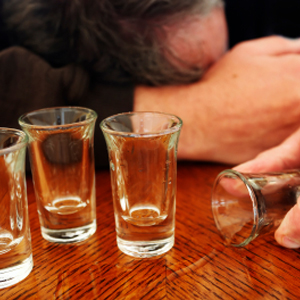
iStock
Physicians have long observed that binge drinking can significantly impair the healing process following a bone fracture.
A recent study by Loyola University Medical Centre researchers is providing insights into how alcohol slows healing on the cellular and molecular levels. The findings could lead to treatments to improve bone healing in alcohol abusers, and possibly non-drinkers as well.
"Many bone fractures are alcohol-related, due to car accidents, falls, shootings, etc.," says Roman Natoli, MD, PhD "In addition to contributing to bone fractures, alcohol also impairs the healing process. So add this to the list of reasons why you should not abuse alcohol."
Researchers studied the effects that alcohol consumption had on bone healing in mice. One group of mice was exposed to alcohol levels roughly equivalent to three times the legal limit for driving. A control group was exposed to equal amounts of saline (salt water).
The study found three ways in which alcohol impaired bone healing after a fracture:
• There were differences between the control group and the alcohol-exposed group in the callus, the hard bony tissue that forms around the ends of fractured bones. In the alcohol-exposed group, the callus was less mineralised, meaning not as much bone was forming. Moreover, the bone that did form was not as strong.
• Mice exposed to alcohol showed signs of oxidative stress, a process that impairs normal cellular functions. The alcohol-exposed mice had significantly higher levels of malondialdehyde, a molecule that serves as a marker for oxidative stress. Additionally, levels of an enzyme that decreases oxidative stress, super oxide dismutase, were higher in the alcohol-exposed mice (but not quite high enough to be considered statistically significant).
• During the healing process, the body sends immature stem cells to a fracture site. After arriving at the site, the stem cells mature into bone cells. Two proteins, known as SDF-1 and OPN, are involved in recruiting stem cells to the injury site. In the alcohol-exposed group, OPN levels were significantly lower.
Countering negative effects
As a follow up to this study, Natoli is planning an animal-model study on two potential treatments to counter the negative effects of alcohol on bone healing. One treatment would be to inject mice with stem cells to improve healing. The other treatment would be the administration of NAc, an antioxidant that combats oxidative stress.
If such treatments were shown to be effective in alcohol abusers, it's possible the treatments also might speed healing in non-drinkers as well, Natoli said.
Natoli is a resident physician in the Department of Orthopaedic Surgery and Rehabilitation at Loyola University Chicago Stritch School of Medicine. Callaci is an assistant professor in the Department of Orthopaedic Surgery and Rehabilitation. The third author is Rachel Mauer, BS, a research technician.
A recent study by Loyola University Medical Centre researchers is providing insights into how alcohol slows healing on the cellular and molecular levels. The findings could lead to treatments to improve bone healing in alcohol abusers, and possibly non-drinkers as well.
"Many bone fractures are alcohol-related, due to car accidents, falls, shootings, etc.," says Roman Natoli, MD, PhD "In addition to contributing to bone fractures, alcohol also impairs the healing process. So add this to the list of reasons why you should not abuse alcohol."
Researchers studied the effects that alcohol consumption had on bone healing in mice. One group of mice was exposed to alcohol levels roughly equivalent to three times the legal limit for driving. A control group was exposed to equal amounts of saline (salt water).
The study found three ways in which alcohol impaired bone healing after a fracture:
• There were differences between the control group and the alcohol-exposed group in the callus, the hard bony tissue that forms around the ends of fractured bones. In the alcohol-exposed group, the callus was less mineralised, meaning not as much bone was forming. Moreover, the bone that did form was not as strong.
• Mice exposed to alcohol showed signs of oxidative stress, a process that impairs normal cellular functions. The alcohol-exposed mice had significantly higher levels of malondialdehyde, a molecule that serves as a marker for oxidative stress. Additionally, levels of an enzyme that decreases oxidative stress, super oxide dismutase, were higher in the alcohol-exposed mice (but not quite high enough to be considered statistically significant).
• During the healing process, the body sends immature stem cells to a fracture site. After arriving at the site, the stem cells mature into bone cells. Two proteins, known as SDF-1 and OPN, are involved in recruiting stem cells to the injury site. In the alcohol-exposed group, OPN levels were significantly lower.
Countering negative effects
As a follow up to this study, Natoli is planning an animal-model study on two potential treatments to counter the negative effects of alcohol on bone healing. One treatment would be to inject mice with stem cells to improve healing. The other treatment would be the administration of NAc, an antioxidant that combats oxidative stress.
If such treatments were shown to be effective in alcohol abusers, it's possible the treatments also might speed healing in non-drinkers as well, Natoli said.
Natoli is a resident physician in the Department of Orthopaedic Surgery and Rehabilitation at Loyola University Chicago Stritch School of Medicine. Callaci is an assistant professor in the Department of Orthopaedic Surgery and Rehabilitation. The third author is Rachel Mauer, BS, a research technician.




 Publications
Publications
 Partners
Partners










